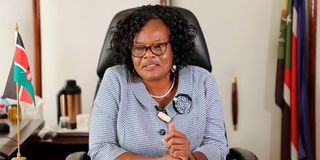A nation at the crossroads: Four counties bear the burden of teen pregnancy battle

Teen pregnancy crisis - Nairobi City leads with staggering 6.1 per cent as Kakamega, Narok, and Bungoma struggle to protect vulnerable girls.
What you need to know:
- Four counties—Nairobi, Kakamega, Narok, and Bungoma—continue to have the highest teen pregnancy rates despite a national decline.
- Advocates cite parental neglect, poverty, cultural practices, and inadequate funding as key challenges.
- Girls as young as 10-14 becoming pregnant and many dropping out of school.
Sixteen-year-old Mercy (not her real name) nervously clutches her school bag as she walks into the antenatal clinic. Her dreams of becoming a doctor momentarily suspended, she joins hundreds of thousands of Kenyan adolescents navigating pregnancy while still children themselves. Behind each statistic is a story—of dreams deferred, of systems that failed, and sometimes, of resilience in the face of overwhelming odds.
Across Kenya, the battle against teenage pregnancy rages on. While recent data shows modest improvements, four counties continue to shoulder a disproportionate burden of this national crisis—a crisis that systematically denies girls their right to education and a quality life.
An analysis of economic surveys by the Kenya National Bureau of Statistics over the past two years reveals a troubling pattern.
Nairobi City County, Bungoma, Kakamega, and Narok consistently contribute the highest numbers to Kenya's teenage pregnancy rates, measured by adolescents presenting with pregnancy at their first antenatal care (ANC) visit.
In the 2024 survey, Nairobi City, Bungoma, and Kakamega counties led with contributions ranging from 4.2 to 6.2 per cent, followed by Narok County at between 2.8 and 4.1 per cent. During this period, the number of adolescents (aged 10–19 years) presenting with pregnancy at the first ANC visit declined by 1.9 per cent to 253,300. Those aged 10–14 years saw a sharper drop of 9.5 per cent to 11,831. For adolescents aged 15–19 years, the numbers declined by 1.5 per cent to 241,483.
The 2025 survey showed further improvement, with the number of adolescents aged 10-19 presenting with pregnancy at their first ANC visit decreasing by 4.8 per cent to 241,228 in 2024. Despite this promising trend, the same counties maintained their unfortunate lead: Nairobi City (6.1 per cent), Kakamega (4.8 per cent), Narok (4.4 per cent), and Bungoma (4.4 per cent).
The home front: Where the battle begins
In Nairobi's bustling neighbourhoods, Joash Nyagaya has spent years working with teenagers through his organisation, Teenage Sensitisation Community-Based Organisation. His conclusion after countless interventions is straightforward but profound.
"The problem starts at home," Nyagaya says, his voice reflecting the frustration of fighting an uphill battle.
"From my interactions with parents, they often tell me they can no longer control their children, so they surrender them to society and society has become increasingly cruel."
His conversations with pregnant teenagers consistently point back to fundamental breakdown at home. Many girls, he explains, are forced into exploitative relationships simply to afford basic necessities like sanitary towels that their parents cannot provide.
"Parents are still the primary figures in their children's lives. They cannot abdicate that responsibility. They need support, especially in how to engage their teenagers and provide age-appropriate sexual and reproductive health information," he recommends.
Cultural battles in Western Kenya
In the verdant counties of Kakamega and Bungoma, the crisis takes on different dimensions. Local leaders attribute the high prevalence of teenage pregnancies to a toxic mixture of poverty, inadequate sexual and reproductive health education, and entrenched cultural norms.
Governors in both counties have publicly pledged to eliminate teenage pregnancies, new HIV infections, and harmful practices such as child marriage. They've called on stakeholders to partner with county governments in awareness campaigns as a key strategy in stemming the crisis.
Kakamega County has taken a decisive step by signing a five-year agreement with the French Government, through the Reproductive Health Network of Kenya, to combat gender-based violence and teenage pregnancy.
Dr Livingstone Imbayi, the County Executive Committee Member for Health, described the agreement as "long overdue," particularly following the withdrawal of US government support for various health programs, which has significantly hampered reproductive health services.
Dr Imbayi didn't mince words when warning those who target schoolgirls.
"We are partnering with school heads across the county in this fight. The Kakamega County Sexual and Gender-Based Violence Control and Management Act, 2023, provides a framework for public awareness on the causes, impact, and consequences of SGBV. Let this be a warning to those preying on our girls—such vices have no place in our county, and perpetrators will face the law," he said.
In neighbouring Bungoma, Governor Kenneth Lusaka has taken a data-driven approach, directing sub-county, ward, and village administrators to submit regular reports on teenage pregnancies in their respective areas. Under his leadership, the county launched a pilot mentorship program specifically targeting the high rates of adolescent pregnancies.
The county has also adopted the Imarisha Msichana project, implemented by the Forum for African Women Educationalists Kenya Chapter, to raise awareness and reduce incidences of teen pregnancy.
"Maintaining accurate data is crucial for developing targeted strategies," Lusaka explained, while urging parents, local leaders, and schools to initiate open discussions about sex and health.

Bungoma County Deputy Governor Janepher Mabatiany. The county has adopted the Imarisha Msichana project to raise awareness and reduce incidences of teen pregnancy.
Despite these promising initiatives, both counties face a common challenge: insufficient funding. Despite introducing County Gender-Based Violence Acts and launching awareness campaigns, the impact has been limited by meagre budgetary allocations to gender departments.
Bungoma's Deputy Governor Janepher Mbatiany revealed the stark reality—the gender department received only Sh6.5 million in the 2023–2024 budget.
"We're working to change the mind-set of our leaders, especially in the county assembly, so they appreciate the need for increased funding for the gender department," she said.
The shadow of tradition in Narok
In Narok County, where the Maasai culture holds strong influence, the fight against teenage pregnancies faces unique cultural barriers. Officials spoke on condition of anonymity, fearing professional repercussions for "exposing the county."
"Here, FGM and early marriage are still widely practised," said Mary*, a reproductive health officer.
"Once girls undergo the cut, they're viewed as ready for marriage, making pregnancy almost inevitable."
She noted that initiatives like Binti Shupavu and Imarisha Msichana have been launched to educate girls on life skills, mentorship, and contraceptive use.
Local chiefs like Jackson* report that increased parental engagement has helped reduce cases in some areas.
However, significant challenges persist.
In Maji Moto, more than 20 girls are currently pregnant. At Nchaishi School, parents have raised alarm over the long walks to school through wildlife-inhabited areas, putting girls at risk.
"Some interventions fail because they ignore cultural realities," warned activist Grace*. "Without involving local leaders and addressing harmful beliefs, change cannot be sustained."
Meru's multi-stakeholder approach
In Meru County, the statistics paint an equally troubling picture. Health data reveals that teen mothers account for approximately 30 per cent of all deliveries in the county.
Tigania East, Tigania West, Igembe Central, and Igembe North sub-counties have the highest rates, with teenage mothers making up over 35 per cent of all deliveries.
Prince Mwenda, Senior Project Manager at Ripples International, described the county's multi-stakeholder approach to address the problem. This comprehensive strategy includes collaboration across sectors, anti-SGBV advocacy, training of police, healthcare workers, and gender officers, and reintegrating teen mothers into education.
Children unable to return to school are being supported with technical and business skills to prevent them from falling into deeper cycles of poverty.
"Collaboration has improved data-sharing and made response efforts more evidence-based. Training police and health workers has enhanced case handling and justice delivery," Mwenda said.
One innovative response has been the establishment of Greenlands Schools, which accommodates teen mothers and their babies, helping to break the poverty cycle linked to teenage pregnancies.
Director Gacheri Muthuri explained the urgent need for such institutions: "Meru is among the top counties in teenage pregnancies. Most girls who fall pregnant drop out of school due to stigma and the burden of motherhood. We want to give them another chance."
The school offers both secondary and vocational education, supports teen mothers at the primary level, and assists girls in seeking legal redress in cases of gender-based violence.
Despite these efforts, Mwenda noted that reintegration faces significant obstacles due to persistent stigma and weak parental support.
"Some schools remain hesitant to accept survivors back, despite the Ministry of Education having a clear school resumption policy. There is also no clear framework for delivering age-appropriate sexual and reproductive health education to children," he said.
He added that delayed justice further undermines the fight against teenage pregnancies, allowing perpetrators to escape consequences while victims bear lifelong burdens.
*Some names have been changed to protect identities.
Moraa Obiria, Shaban Makokha, Tobby Messo & David Muchui

